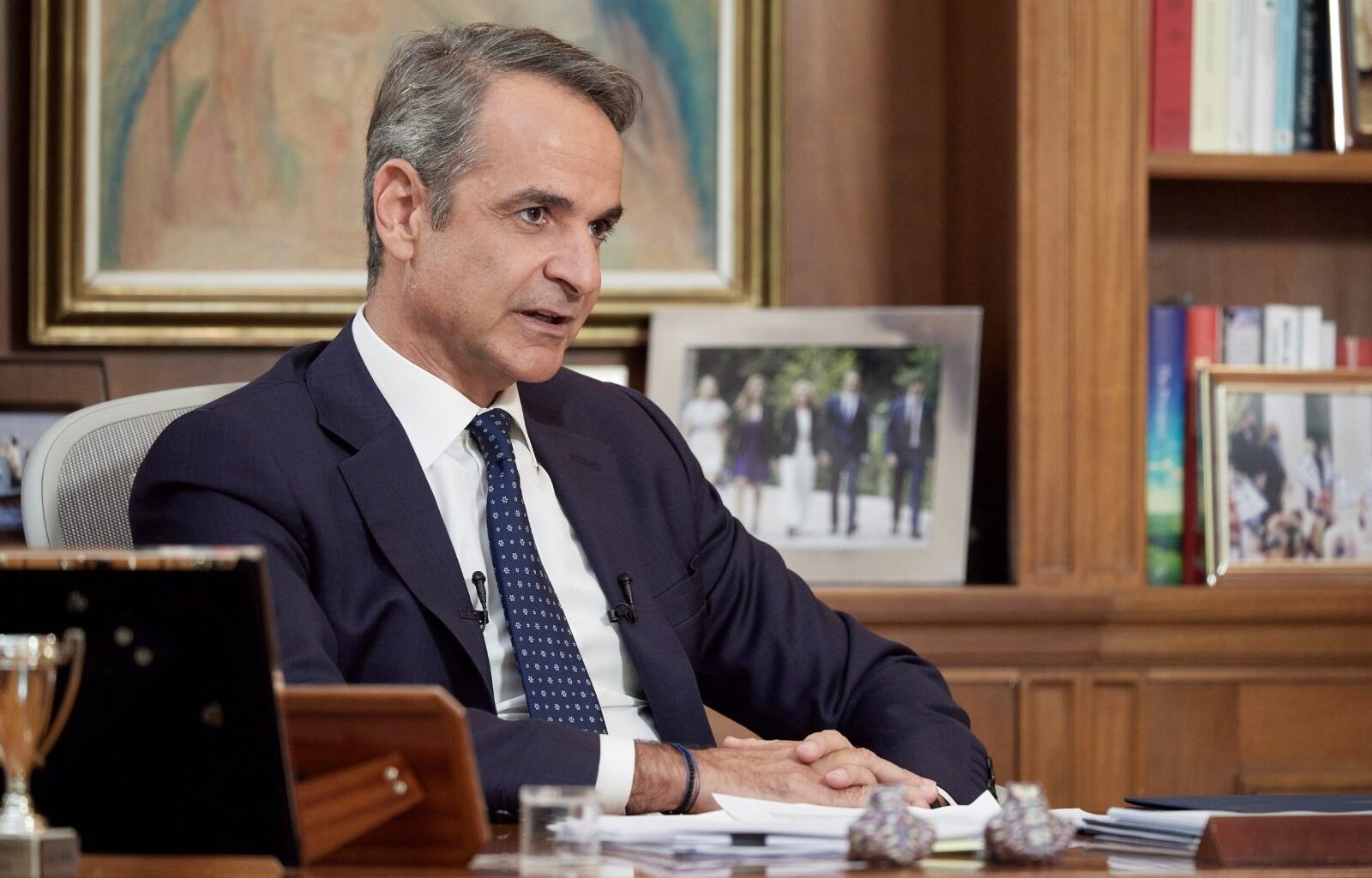Greek Prime Minister Kyriakos Mitsotakis on Wednesday reiterated that the country will never accept any notion of “grey zones” in the Aegean, in answer to a question over Turkey’s standing claims and what Athens decries as the latter’s revisionist policy regarding maritime borders and delimitation, and even sovereignty in the Aegean.
Mitsotakis spoke during a wide-ranging television interview on Wednesday afternoon, which was videotaped and shown a few hours later on the prime-time newscast of Skai TV.
The Greek premier fielded and answered questions ranging from foreign policy to domestic issues and investigations of corruption in state services, such as the ongoing furor over fraudulent farm subsidy payments, the “OPEKEPE” scandal, named after the now defunct agency.
Asked first about the Erdogan government’s revisionist and irredentist “Blue Homeland” doctrine – which is now apparently embedded into Turkey’s “deep state” dogma – he said:
“The truth is that the ‘Blue Homeland’ narrative has over time been promoted more intensely. However, it is equally true that Greece has reacted to this narrative in various ways, with different measures and initiatives taken…”
In continuing with foreign policy, and especially often thorny relations with Turkey, Mitsotakis said:
“I always look forward to calm waters and peaceful relations with Turkey, and I believe that through dialogue and goodwill, we can at least avoid the extreme tensions that plagued us both in Evros and in the summer of 2020,” he said, referring initially to a crisis along the Greek-Turkish land border, whereby Ankara said it would stop preventing third country nationals from trying to illegally enter Greece. The second 2020 reference was to a brief standoff in a portion of the east Mediterranean, ignited by Turkey’s attempt to conduct exploration activities in waters Athens considers as part of its future EEZ.
The latest “hiccup” in relations came this month with Ankara’s irritation over the declaration of a marine park in the southern Aegean by Athens – a declaration that was announced strictly within Greek territorial waters of six nautical miles.
“Environmental initiatives such as marine parks should be embraced by all countries, because ultimately the marine environment is shared. We’re not discussing issues of sovereignty with Turkey,” he stressed.
“These marine parks extend in our territorial waters. Our territorial waters are defined by the (Aegean) islands, which belong to Greece, and there is no issue of Turkey disputing Greek islands…Greece will never accept any theory of grey zones and will not allow Turkey to dictate what we will or will not do within areas under Greek sovereignty.”
SAFE Program
He added that unanimity is required for Turkey to join the EU’s SAFE program, which aims to strengthen the European defense industry through joint procurement and financing.
“As long as it (official Turkey) insists on casus belli against Greece and raises issues of grey zones in the Aegean, that country will not join the program. Greece will not allow it.”
Turkey-Libya MoU ‘illegal, unreasonable’
Along the same lines, he was asked about the recently strained relations with the still fractured and unstable North African country of Libya, in light of a controversial 2019 Turkey-Libya MoU to ostensibly delimitate Exclusive Economic Zones between them – essentially by “erasing” all Greek island territory in the process.
“The Turkey-Libya memorandum is both illegal and unreasonable and does not generate any rights…the fact that it does not generate any rights is clearly demonstrated by Chevron’s decision to engage in dialogue with us.
“Greece has the EU on its side regarding Libya, it has strategic relations with Egypt, Saudi Arabia and the UAE, and Libya must choose whether it wants to side with its immediate neighbor or whether it wants to be Turkey’s tool.”
He also called on the internationally recognized Tripoli-based government in Libya, which controls only the western part of the country, to negotiate with Greece over a delimitation of a continental shelf and EEZ between the two states.
Migration
Asked about the problem of irregular migration, in the wake of a new “route” now being used by migrant smugglers based in eastern Libya to reach Crete, he expressed his government’s recently stiffened stance.
“Greece has managed other migration crises in the past… In March 2020, the country protected its borders and prevented an organized incursion of migrants. Today, Turkey’s policy on this issue has changed. People who set foot on Greek soil will, essentially, be jailed. We are sending a message to traffickers and their clients that Greek territory will not be synonymous with an easy entry.
“Is there someone suggesting something different? Should we sink the boats in the middle of the sea? I hope not,” he said, essentially referring to sharp criticism from smaller right-wing parties calling for more draconian measures to deter irregular migrants from attempting to reach Greece.
Greece-Cyprus power cable
In another regional issue that has emerged on the forefront over the past year, he emphasized that the Greece-Cyprus undersea power cable project will proceed and will be completed at an appropriate time.
“The costs should be shared fairly. Turkey must understand that it cannot seek closer ties with Europe while seeking to block European projects,” he said, first initially referring to Nicosia’s reputed qualms over cost-sharing for the ambitious endeavor.
Farm subsidy scandal
Turning to domestic issues, he called the major scam involving doled out agriculture subsidies to non-eligible producers as something that extends over many years, touches all political parties that have governed and is a social problem.
“For 40 years, various generations have learned to depend exclusively on community subsidies for their future… Decisions were made because someone did something; we did not wait for the European Public Prosecutor’s Office. OPEKEPE was a ‘cottage industry’ that unfortunately had to be rehauled while in operation.
“The decision to abolish OPEKEPE came before a decision by the European Public Prosecutor’s Office. Everyone knows that this party (of corruption) is coming to an end.”
